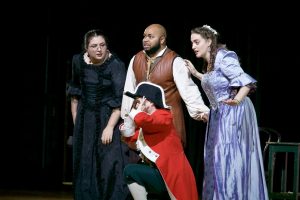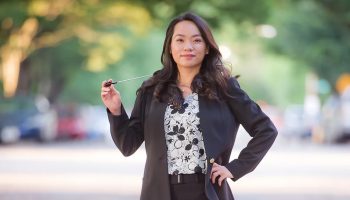
Aside from performing a vast array of repertoire and transforming into characters, opera singers can also be teachers.
In June, Chautauqua Opera Company Young Artists, including tenor James Stevens, mezzo-soprano Antona Yost, mezzo-soprano Gabrielle Beteag and baritone Yazid Gray, toured 18 local elementary schools performing Kristine McIntyre’s The Barber of Seville in California. They also taught a music lesson to the students before the performance.
For Stevens, introducing kids to music — particularly opera — and teaching different life lessons through music is important.
“The rewarding part about bringing this into schools is that it’s all still the same music, and they are still getting exposed to a masterpiece, but it’s getting presented in a little bit different way,” Stevens said.
At 5 and 7 p.m. Tuesday, July 16 in Smith Wilkes Hall, Stevens, Yost, Beteag and Gray will bring the Family Entertainment Series performance of The Barber of Seville in California out of the classroom and onto the stage.
The performance is a condensed, bilingual adaptation of Rossini’s The Barber of Seville. It’s a one-act opera lasting less than 45 minutes, intended for young audiences. Gray, who plays Figaro, said the opera was a lot of fun to perform despite how fast it moved.
“It moves very quickly,” Gray said, “which is great for staying engaged with the piece, but you still have all those major plot points.”
Rossini’s The Barber of Seville is a classic romantic comedy about a rich nobleman is in love with a lovely maiden. The love-struck nobleman — Count Almaviva — hopes to make the lovely Rosina fall in love with him. But Rosina is the ward of the grumpy Dr. Bartolo, who wants to marry Rosina himself when she becomes of age. Figaro, his servant, helps the Count in his pursuit of Rosina’s love, per the Count’s request.
The Barber of Seville in California is the same story — English-speaking Count Almaviva, played by Stevens, hopes to make the Spanish-speaking Rosina, played by Yost, fall in love with him. In this version, Rosina’s guardian Dr. Bartolo is Aunt Bartolo, played by Beteag. Instead of Bartolo’s obsession to marry Rosina to get her money, Aunt Bartolo is a micromanaging aunt who wants to keep control of Rosina and her money. The Count asks Figaro to help him in his quest.
Beteag said since Bartolo is a bass-baritone role, she got to experiment with different octaves as well as the comedy.
“It was an interesting challenge to think beyond my own voice part,” Beteag said. “Of course, I sang it in a comfortable octave but I still got to play around with the buffoonery.”
The comedy in the opera is played up a bit more, creating an entertaining opera for all ages. When the Young Artists performed this show in elementary schools, the message from the performance was clear — no matter a person’s background or language, love will find anyone.
“My favorite part was showing (students) through the show that it’s cool to be bilingual,” Yost said, “and that people who speak different languages can fall in love.”
Rosina and the Count fall in love despite their differences in language. Throughout the school visits in June, students would ask other students who spoke Spanish to translate some of the lines — a favorite moment for Yost. The performance not only taught the students about opera, but about language.
Director of Arts Education Suzanne Fassett Wright said the performance will help audience members of all ages learn more about opera and language — they may even start singing along with Figaro.
“They will enjoy a very energetic experience that brings opera home to them,” Wright said. “It enables students to become involved in the performance — it’s a very interactive performance.”
Wright hopes the two performances of The Barber of Seville in California will not only entertain, but connect people through opera.
“I would encourage people to come and experience opera in a new and unique way that is meant to reach people of all ages and embrace opera as an art form for everyone,” Wright said.




